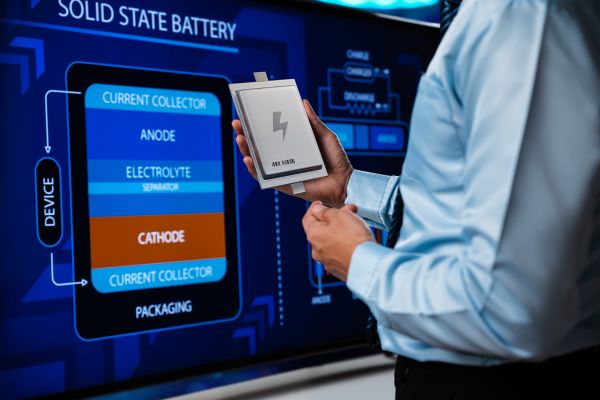The automotive industry is on the brink of a profound transformation, driven by the urgent need to address climate change and reduce greenhouse gas emissions. In the quest for a greener and more sustainable future, electric vehicles (EVs) have emerged as the vanguard of clean transportation. As the popularity of EVs soars, the demand for more efficient and high-performing batteries intensifies. Among the most promising contenders to revolutionize EV battery technology are solid-state batteries, a cutting-edge innovation that holds the potential to redefine the electric mobility landscape.
Solid-state batteries offer tantalizing benefits compared to conventional lithium-ion batteries. These next-generation power storage solutions promise higher energy density, faster charging capabilities, improved safety, and longer lifespan. With the ability to transcend the limitations of current battery technology, solid-state batteries present an unprecedented opportunity to supercharge the adoption of electric vehicles on a global scale. In this race towards automotive excellence, European manufacturers have emerged as frontrunners, vying to be the first to deliver commercially viable solid-state batteries to the market.
As automotive giants and newcomers alike strive to harness the full potential of solid-state batteries, the competition among European manufacturers has become a thrilling spectacle. Beyond the allure of technological prowess, the development of solid-state batteries carries the promise of revolutionizing the electric mobility ecosystem. In this article, we delve into the intricacies of the race to solid-state batteries in Europe, exploring the groundbreaking innovations, collaborative efforts, and technological milestones that shape the future of EVs and the broader automotive landscape. As the world eagerly anticipates the arrival of solid-state batteries, the stage is set for a transformative chapter in the evolution of clean and sustainable transportation.
Breaking Barriers in Energy Density
In the pursuit of solid-state batteries, European manufacturers are determined to break barriers in energy density, unlocking the true potential of electric mobility. Energy density refers to the amount of energy stored per unit mass or volume, and it is a critical factor in determining the driving range and overall performance of electric vehicles. Conventional lithium-ion batteries have served as the backbone of EVs, but their limited energy density poses challenges in achieving long-range capabilities that can rival traditional internal combustion engine vehicles.
European automakers have set their sights on pushing the boundaries of energy density in solid-state batteries to enhance the driving range and versatility of EVs. Extensive research and development efforts are dedicated to exploring novel materials and advanced manufacturing techniques that can maximize energy storage capacity. The race to develop solid-state batteries with breakthrough energy density involves a delicate balance between achieving optimal performance and maintaining cost-effectiveness for widespread adoption.
Beyond the realm of electric vehicles, breaking barriers in energy density holds implications for various sectors, including renewable energy storage and portable electronics. Solid-state batteries with significantly higher energy density can revolutionize renewable energy integration, ensuring a stable and efficient grid with seamless energy storage and distribution. Moreover, portable electronics can benefit from longer-lasting batteries that reduce the need for frequent charging, offering enhanced convenience and productivity to consumers.
As European manufacturers continue to push the envelope in energy density, they are forging a path towards a future where electric mobility becomes not only the environmentally responsible choice but also the practical and compelling option for consumers worldwide. By shattering the limitations of energy density in battery technology, European automakers are accelerating the transition to a sustainable and electrifying automotive future.
The Challenge of Fast Charging
In addition to energy density, fast charging is another crucial aspect of solid-state battery development. Quick and convenient charging is essential for widespread EV adoption, as it addresses the current limitations of charging time compared to traditional refueling for internal combustion engine vehicles. European manufacturers are striving to design solid-state batteries that can be charged rapidly, offering EV owners the ability to recharge their vehicles in a matter of minutes rather than hours.
Fast charging in solid-state batteries relies on optimizing the solid electrolyte’s ionic conductivity, allowing for swift and efficient ion transfer between electrodes during charging and discharging. Achieving this goal requires intricate engineering and close attention to material composition and manufacturing processes. European automakers are engaged in rigorous testing and validation to ensure the safety and reliability of fast-charging solid-state batteries, as thermal stability is a key concern during rapid charging cycles.
Ensuring Safety and Longevity
Safety is paramount in battery technology, and solid-state batteries offer the promise of enhanced safety compared to their liquid-electrolyte counterparts. The use of solid materials reduces the risk of flammability and thermal runaway, which are among the major safety concerns associated with conventional lithium-ion batteries. European manufacturers are dedicated to engineering solid-state batteries that meet stringent safety standards and withstand the demanding conditions of everyday use.
Moreover, longevity is a critical factor in solid-state battery development. EV owners expect their vehicles to endure for many years, and the battery is a key component that must maintain its performance over the vehicle’s lifespan. European automakers are conducting extensive durability testing to ensure that solid-state batteries can withstand repeated charge and discharge cycles without significant degradation. Achieving long-lasting solid-state batteries is essential for reducing EV ownership costs and supporting sustainable transportation solutions.
Collaboration and Competition
The race to solid-state batteries has sparked both collaboration and competition among European automakers. While each manufacturer is keen on securing a leading position in solid-state battery development, they also recognize the importance of sharing knowledge and resources to accelerate progress. Collaborative efforts often involve research partnerships with academic institutions, cross-industry collaborations, and even sharing intellectual property to advance solid-state battery technology collectively.
At the same time, competition is fierce, and every European manufacturer is striving to be the first to bring a commercially viable solid-state battery to market. The first automaker to achieve this milestone will likely gain a competitive advantage, setting new standards for EV performance and driving range. European automakers are investing in their research and development capabilities, battery manufacturing facilities, and strategic partnerships to ensure they remain at the forefront of the solid-state battery revolution.
Shaping the Future of Electric Mobility
The race to solid-state batteries is not only about technological prowess; it is also about shaping the future of electric mobility and the automotive industry as a whole. As European manufacturers continue to push the boundaries of battery technology, they are influencing global EV trends and contributing to the transformation of transportation systems worldwide.
The widespread adoption of solid-state batteries has the potential to revolutionize electric mobility, making EVs more accessible, practical, and sustainable for the masses. With longer driving ranges, faster charging times, and enhanced safety, solid-state batteries pave the way for a new era of electric mobility that could rival traditional internal combustion engine vehicles in terms of convenience and performance.
In conclusion, the race to solid-state batteries among European manufacturers represents an electrifying chapter in the ongoing journey towards a greener and more sustainable automotive future. As technological breakthroughs continue to propel the development of solid-state batteries, the day when EVs equipped with this cutting-edge technology become mainstream is drawing closer. The European automaker that successfully achieves this milestone will undoubtedly leave an indelible mark on the automotive landscape, shaping the future of electric mobility and accelerating the transition to a cleaner and more electrifying tomorrow.



